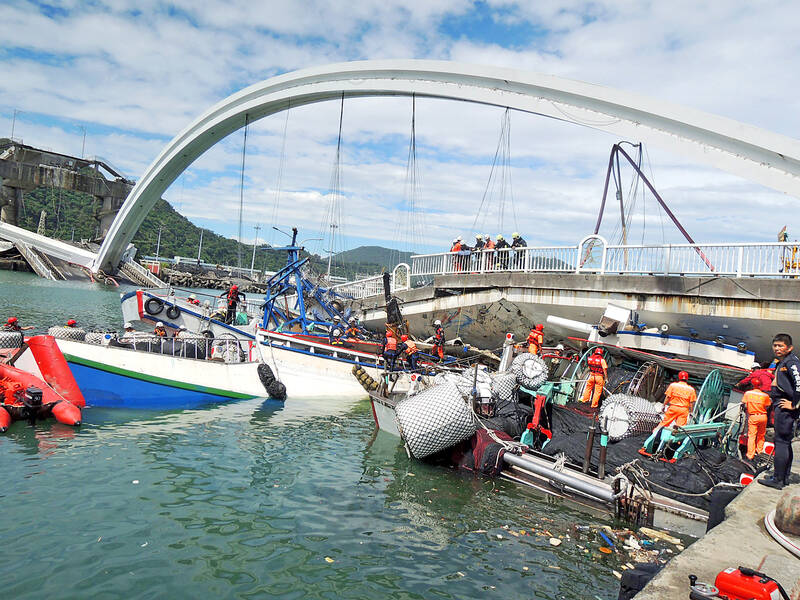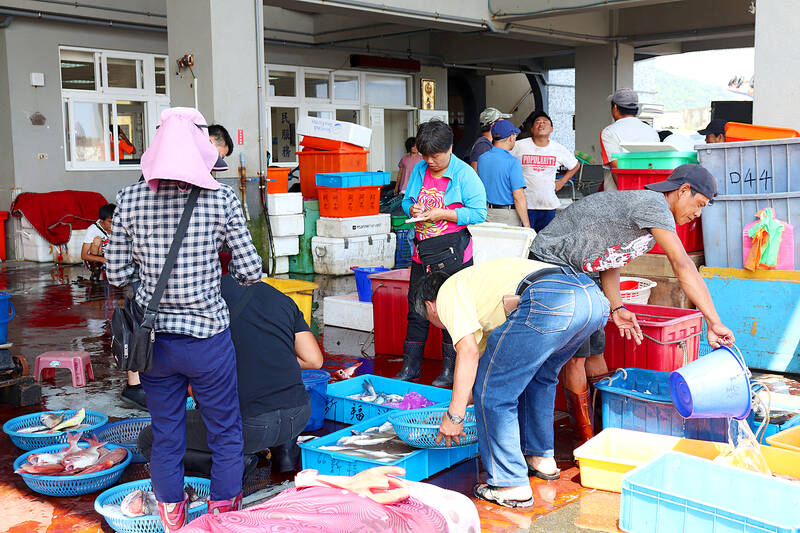Before the recall election drowned out other news, CNN last month became the latest in a long line of media organs to report on abuses of migrant workers in Taiwan’s fishing fleet. After a brief flare of interest, the news media moved on. The migrant worker issues, however, did not.
CNN’s stinging title, “Taiwan is held up as a bastion of liberal values. But migrant workers report abuse, injury and death in its fishing industry,” was widely quoted, including by the Fisheries Agency in its response. It obviously hurt.
The Fisheries Agency was not slow to convey a classic government defense, one that detailed each of the mentioned cases, and assured the public that the problem was a few bad apples.

Photo: Chiang Chih-hsiung, Taipei Times
“Taiwan has approximately 940 distant-water fishing vessels,” it averred a few days later. “The vast majority of vessel operators and captains operate legally, respect the rights and benefits of migrant fishers and prioritize safety at sea.”
It is quite true that most fishing boats operate legally — that’s the root of the problem.
The response followed the classic framing of the issue: systemic problems in the fleet vs individual captain behavior, with some complaints about the government being dilatory in making changes. That framing, accepted by so many writing on migrant worker abuses, avoids the heart of the issue: a key driver of migrant labor abuses is the government’s subsidy structures. The distant water fisheries (DWF) industry could not exist without them.

Photo: Lin Ching-lun, Taipei Times
LABOR LAW CUTOUT
The subsidies start with the labor law cutout for migrant workers in the distant water fleet. Taiwan has a total fishing fleet of over 21,000 vessels, with roughly a thousand operating in distant waters (the number could be much larger since many Taiwanese vessels fly flags of convenience). This fleet is generally considered the second largest DWF fleet in the world after China’s. Migrant workers constitute 62 percent of Taiwan’s DWF fleet labor, and 13 percent of coastal and offshore fisheries labor, according to 2023 Fisheries Agency numbers.
Migrant workers in the coastal and offshore fisheries are protected by the Ministry of Labor (MOL) and receive the basic minimum wage. By contrast, migrant workers in distant water fisheries are considered “overseas employees” and are regulated by the Fisheries Agency, not the MOL. They are paid less. A 2021 study in the journal Marine Policy calculated that they make roughly three-fourths of what their coastal and offshore brethren make (after deductions). For DWF workers, labor inspections and insurance are weaker, and limits on working hours much less restrictive. This regime was established in 2017 in response to the European Union giving Taiwan a “yellow card” in 2015 because of the widespread abuses in the fishing fleet. It used to be even worse.
Note that Taiwanese vessels sailing under flags of convenience are not subject to any Taiwan labor regulations.
WAGES AND DEBT
Low salaries and loose inspection regimes are an invitation to abuse. Another incentive is the visa system. Because the visa for coastal and DWF migrant workers is tied to their employer, the ship owner need merely terminate their employment and the worker is immediately deported. Migrant laborers typically take on debt to find a job, and cannot afford to be fired. The threat of instant deportation thus silences them.
The debt problem is also a deliberate creation of the system. Under Taiwan’s Action Plan on Fisheries and Human Rights, wages should be paid directly to migrant workers. However, as a study last year documented, most migrant workers are still paid by their recruitment agencies. Recruitment agencies can deduct money from fishers’ salaries to repay expenses and recruitment costs, effectively creating a cycle of debt for fisheries workers. Indeed, withheld wages have been cited in US Department of Labor reports on Taiwan’s fisheries fleet as a chronic problem. The lack of meaningful government intervention to stop this illegality acts as a subsidy.
It is remarkable how often one encounters this strange reluctance to intervene whenever migrant labor issues are explored.
FUEL
The fishing fleet is also the recipient of numerous direct subsidies. For example, Taiwan has offered the fishing fleet fuel subsidies since 1960. All other things being equal, subsidies increase the size of the subsidized sector. When industries grow large and unregulated, abuses proliferate. Further, before 2002 Taiwanese vessels were exempted from business taxes on “fishing boats for coastal or offshore fishery and machinery, equipment, nets and fuel used by fishing boats”. Their fuel subsidies were also much larger, but that year changes were made due to entry into the WTO. Fuel subsidies were slashed, but the business tax exemptions were retained, in response to anger from local fishermen. In 2005 Taiwanese vessels were equipped with electronic monitors which recorded their travels and permitted only subsidies for that, reducing subsidies again.
Most importantly, the Fisheries Agency operates a network of Fisherman’s Associations, one national and 39 local, with over 400,000 members. These are divided into three basic departments: economic, credit and services. Intended to help fishermen, they are responsible for a wide array of activities, helping with marketing, storage, and processing of products, loans and banking and services such as insurance and training. The local fishing industry could not exist, let alone operate a massive DWF fleet, without this supporting framework.
Reforms, such as putting the government instead of brokers in charge of migrant workers, or forcing fishing boat captains to install Wi-Fi to facilitate instant communication of problems (and help workers stay in touch with loved ones), are now perennial suggestions, perennially ignored. “Government foot-dragging,” so often the lens used to view government inaction, conceals more than it explains.
INTERNATIONAL PRESSURE
The existence of this comprehensive subsidy regime implies that the government has for decades had critical, powerful leverage over fishing boat captains, which it refuses to use to put a stop to the abuses.
There is some international pressure, but more is needed. The US Department of Labor last year listed Taiwan’s fishing industry on its List of Goods Produced by Child Labor or Forced Labor. It said that “workers face hunger and dehydration, live in degrading and unhygienic conditions, are subjected to physical violence and verbal abuse, are prevented from leaving the vessel or ending their contracts and are frequently not paid their promised wages or have food and lodging fees illegally deducted from their wages.”
In discussing the report, Greenpeace noted that “Bumble Bee — one of the main US canned tuna companies — is owned by Taiwanese tuna trader FCF and has been linked to Taiwanese fish caught with forced labor.”
The problem is not the nature of Taiwanese fishing boat captains or “a few bad apples.” Rather, the problems are created, shaped and controlled by the flows of government intervention and non-intervention. This non-intervention is not “foot-dragging” but obviously, considered policy. Clearly the government wants the problems dumped overboard at sea.
Which is, as Joe Henley pointed out to writer Sean Scanlon in an excellent AmCham 2023 piece on migrant fishery workers, what Taiwan fishing boat captains are legally allowed to do with the corpses of migrant workers who die aboard their ships.
Notes from Central Taiwan is a column written by long-term resident Michael Turton, who provides incisive commentary informed by three decades of living in and writing about his adoptive country. The views expressed here are his own.

Growing up in a rural, religious community in western Canada, Kyle McCarthy loved hockey, but once he came out at 19, he quit, convinced being openly gay and an active player was untenable. So the 32-year-old says he is “very surprised” by the runaway success of Heated Rivalry, a Canadian-made series about the romance between two closeted gay players in a sport that has historically made gay men feel unwelcome. Ben Baby, the 43-year-old commissioner of the Toronto Gay Hockey Association (TGHA), calls the success of the show — which has catapulted its young lead actors to stardom -- “shocking,” and says

The 2018 nine-in-one local elections were a wild ride that no one saw coming. Entering that year, the Chinese Nationalist Party (KMT) was demoralized and in disarray — and fearing an existential crisis. By the end of the year, the party was riding high and swept most of the country in a landslide, including toppling the Democratic Progressive Party (DPP) in their Kaohsiung stronghold. Could something like that happen again on the DPP side in this year’s nine-in-one elections? The short answer is not exactly; the conditions were very specific. However, it does illustrate how swiftly every assumption early in an

Inside an ordinary-looking townhouse on a narrow road in central Kaohsiung, Tsai A-li (蔡阿李) raised her three children alone for 15 years. As far as the children knew, their father was away working in the US. They were kept in the dark for as long as possible by their mother, for the truth was perhaps too sad and unjust for their young minds to bear. The family home of White Terror victim Ko Chi-hua (柯旗化) is now open to the public. Admission is free and it is just a short walk from the Kaohsiung train station. Walk two blocks south along Jhongshan

Francis William White, an Englishman who late in the 1860s served as Commissioner of the Imperial Customs Service in Tainan, published the tale of a jaunt he took one winter in 1868: A visit to the interior of south Formosa (1870). White’s journey took him into the mountains, where he mused on the difficult terrain and the ease with which his little group could be ambushed in the crags and dense vegetation. At one point he stays at the house of a local near a stream on the border of indigenous territory: “Their matchlocks, which were kept in excellent order,